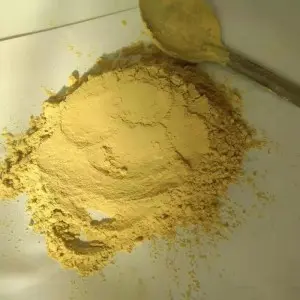Cherry pollen is a high-quality, natural product derived from the vibrant blossoms of cherry trees, playing a crucial role in the pollination process that supports healthy fruit development. Rich in essential nutrients, including proteins, vitamins, minerals, and antioxidants, cherry pollen is valued not only for its agricultural benefits but also for its potential health advantages. In orchards, cherry pollen is key to facilitating cross-pollination between different cherry tree varieties, ensuring optimal fruit set, improved yields, and better-quality cherries. Beyond its agricultural uses, cherry pollen is becoming increasingly popular as a dietary supplement due to its powerful nutritional profile. It is believed to support immune health, boost energy levels, and promote overall well-being, making it a favored choice in natural health products. With its gentle, adaptogenic properties, cherry pollen is suitable for a wide range of consumers, including those seeking natural remedies to enhance vitality and stamina. Whether used to improve orchard productivity or incorporated into wellness products, cherry pollen provides numerous benefits, contributing to both agricultural success and personal health. As the demand for sustainable, natural products continues to rise, cherry pollen is emerging as a versatile and valuable resource in both the agricultural and wellness industries.
Cherry Pollen and Its Impact on Pollination Efficiency in Commercial Orchards
Cherry pollen plays a critical role in the success of pollination, directly affecting fruit yield and quality in commercial orchards. As cherries are not self-pollinating, they rely heavily on the transfer of pollen between trees to achieve successful fertilization. This cross-pollination, facilitated by the right type of pollen, is essential for producing high-quality fruit in large quantities.
The efficiency of cherry pollen is influenced by several factors, including the timing of bloom, environmental conditions, and the presence of pollinators. Pollen viability and its dispersal ability are key to ensuring that the pollen reaches other flowers at the right time. Temperature, humidity, and wind can all impact the spread and effectiveness of pollen. For example, dry weather can cause pollen to lose its moisture content, while excessive rain or strong winds can wash away or disperse pollen prematurely, reducing pollination efficiency.
In addition to environmental factors, the health and number of pollinators, primarily bees, also play a crucial role. Pollinators transport cherry pollen from flower to flower, but their effectiveness depends on the availability of high-quality pollen. If the pollen is not attractive to bees or is of poor quality, pollination may be incomplete, resulting in reduced fruit set.
Cherry Pollen and Pollinator Health: The Symbiotic Relationship for Successful Pollination
Cherry pollen and pollinator health share a deeply intertwined relationship that is crucial for successful pollination in orchards. As cherries require cross-pollination, pollen must be transferred from one tree to another, and pollinators like bees play a vital role in this process. Without healthy pollinators and viable cherry pollen, orchards would face reduced fruit yield and poor fruit quality.
The process begins with the cherry tree’s production of high-quality pollen. For optimal pollination, this pollen needs to be viable, abundant, and easily accessible to pollinators. Bees and other pollinators, attracted by the pollen’s scent and nutrients, carry it from one flower to another. The efficiency of this transfer directly affects the fruit set. However, the effectiveness of pollination relies on more than just the quantity of pollen—it also depends on the health of the pollinators involved.
Pollinator health is paramount for the successful spread of cherry pollen. Healthy bees are more efficient in their foraging behavior, ensuring that pollen is transferred effectively between flowers. If pollinators are weakened by disease, pesticides, or poor nutrition, their ability to collect and distribute pollen diminishes. This results in incomplete pollination, lower fruit set, and potentially lower-quality cherries.

